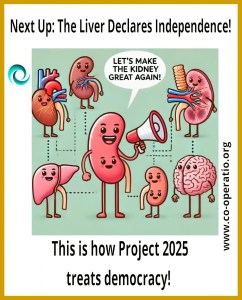🔹 TL;DR: What’s Really at Stake with Project 2025
Project 2025 is not just another political plan. It’s a coordinated push toward centralized control, dismantling cooperative systems that keep democracy functioning. By concentrating power and breaking down communication and trust, it challenges the very way living systems thrive—through shared effort, purpose, and balance.
This blog post explores why Project 2025 matters, how it threatens systemic cooperation, and what we can learn by thinking of society like a living body.

What if your kidney wanted to run the body? That’s Project 2025 logic. Funny—but dangerous when applied to democracy.
📄 Overview: What Is Project 2025?
Project 2025 is a long-term conservative plan—developed by groups like The Heritage Foundation—to reshape the U.S. government. Its key goals include:
- Giving more power to the presidency
- Reducing independent agency oversight
- Prioritizing national self-interest over international collaboration
- Fast-tracking its implementation within 180 days
While this may sound like a streamlined agenda, beneath the surface it represents a shift away from democratic checks and shared responsibility.
🤔 Why It Feels So Unbalanced
Project 2025 promotes a narrative of self-reliance and individualism. But real systems—whether in biology, ecosystems, or societies—rely on cooperation, specialization, and communication to survive. No organ works alone.
Imagine if a kidney said: “Let’s make the kidney great again!” But a kidney can’t survive without the heart, lungs, or blood flow. A system where one part tries to dominate the whole becomes fragile.
This is the underlying problem: Project 2025 undermines the cooperative infrastructure that makes complex systems work.
⚖️ The Breakdown of Balance
Project 2025 shows patterns of:
- Ignoring court rulings
- Silencing journalists and dissent
- Weakening agencies like the Department of Justice (DOJ) or environmental regulators
- Flooding media with noise to confuse and divide
These moves erode transparency, suppress expertise, and increase top-down control. They don’t just damage trust—they short-circuit the system’s ability to adapt and function.
📚 How It Affects Our Everyday Lives
Beyond institutions and headlines, this shift in governance affects us at a personal level. One of the most disruptive tools used is often called the “firehose of falsehood“: the deliberate flooding of public space with conflicting, misleading, or emotionally charged information.
This flood of noise makes it difficult to stay informed, find common ground, or even hold a clear opinion. For many people, this leads to:
- Mental exhaustion
- Decision fatigue
- Disconnection from community and purpose
⚠️ What Can We Do?
The key is not to chase every headline but to focus on meaningful turning points that reveal the direction of the system. One of the most important signals to watch right now is:
How does the administration respond to court rulings?
- If court decisions are respected, basic democratic balance still exists.
- If they are ignored, we are entering dangerous territory.
For everything else, we may need to pause, observe, and focus our energy on what matters. Coordinated action becomes possible again when people reconnect to a shared reality and shared goals.
🧳️ Why It Matters: Cooperation Is How Life Works
In any living system:
- Survival depends on shared signals, not isolated action.
- Strength comes from balance, not domination.
- Thriving requires coordination, not confusion.
Project 2025 breaks these patterns. It favors concentration over collaboration, control over cooperation.
And while some political critiques stay at the level of rights and laws, we can go deeper:
If you want to understand how life works, follow the energy. If you want to understand what’s breaking, follow where the energy stops being shared.
💡 A Final Thought
Project 2025 is more than policy. It’s a test:
Will we build systems where all parts contribute, communicate, and share fairly? Or will we allow power to hoard energy at the top, breaking the very flow that makes life—and democracy—possible?
Now is the time to recognize that cooperation isn’t weakness. It’s how everything alive continues to exist.
No organ survives alone. No system thrives by silencing its parts.


Share your perspective - constructive critique helps this work grow.